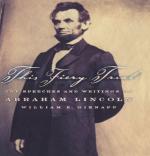|
This section contains 508 words (approx. 2 pages at 400 words per page) |

|
This Fiery Trial: The Speeches and Writings of Abraham Lincoln Summary & Study Guide Description
This Fiery Trial: The Speeches and Writings of Abraham Lincoln Summary & Study Guide includes comprehensive information and analysis to help you understand the book. This study guide contains the following sections:
This detailed literature summary also contains Topics for Discussion and a Free Quiz on This Fiery Trial: The Speeches and Writings of Abraham Lincoln by Abraham Lincoln.
This Fiery Trial is a collection of the speeches and writings of Abraham Lincoln, as selected and edited by William E. Gienapp. They span the entirety of Lincoln's public service career, from 1832 when Lincoln was considering public office in Sangamo County, to April 11, 1865, three days before Lincoln was assassinated.
As Gienapp explains, Lincoln did not reveal much in the way of personal details or a rich emotional life in his public letters, and even in private letters. Instead, what are demonstrated in This Fiery Trial are several of the qualities that made Lincoln a great leader, including moral certitude with respect to slavery, political acumen, and a shrewd military mind.
Lincoln was raised in a rural environment, and was largely self-taught, rising to become a well-respected country lawyer prior to his entry into politics by way of the Illinois State Legislature in 1834. His rhetoric displays a combination of relatable rural aphorisms, imagery and stories, and a classical education of such works as Shakespeare's plays and John Bunyan's The Pilgrim's Progress.
Always a right-leaning moderate, Lincoln embraced the Whig party platform and later spearheaded the Republican party, and was one of its earliest and most important leaders. Early on, he denounced slavery, and throughout his career he wrestled with the question of the status of blacks in the United States. As revealed through his writings, Lincoln walked a thin line on the race issue, calling for an end of slavery, but only as it affected the integrity of the Union. And though Lincoln was enlightened for his time, he still felt blacks were morally and otherwise inferior to whites. He felt blacks should be left alone and segregated, free to pursue their own interests.
Lincoln's 1860 election on an antislavery platform prompted Southern states to secede from the Union to begin the Civil War. Lincoln, particularly in the beginning of the war, kept a tight rein on his generals, and his letters show that Lincoln was adept at military strategy. He correctly believed that the Union's key to victory was to exploit its superior numbers, and that General Robert E. Lee's army was the lynchpin that held the Confederate resistance in place.
Lincoln endured constant criticism from congressmen and others with respect to his military strategy, his choice of generals, his wisdom in issuing the Emancipation Proclamation to free slaves, and his eventual strategy for the reconstruction of the South post-war. At every turn, Lincoln seemed to anticipate his opponents and respond with the ideal retort. He sidestepped criticisms that he was a proponent of racial equality by stating that the Civil War was waged simply to protect the Constitution and to keep the Union together, and that abolition of slavery was a means, not an end.
Lincoln delivered his last speech on April 11,1865, when he called for limited black suffrage in the post-war South. Actor John Wilkes Booth was in the audience and was outraged at the notion of black suffrage, and he murdered the president three days later at Ford's Theater during a performance.
Read more from the Study Guide
|
This section contains 508 words (approx. 2 pages at 400 words per page) |

|



